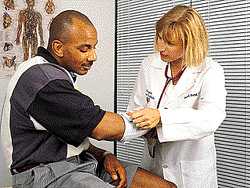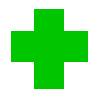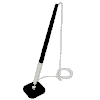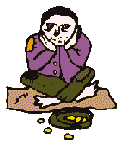| Health |
 |
| Foreign visitors should check at home whether you need vaccinations or not, but the general rule is that you won't. |
 |
In case of ill health, EU citizens can receive free treatment at National Health Service hospitals. While for non-EU citizens treatment within NHS accident and emergency units only is free - if a non-EU citizen needs to be admitted to a ward, they will be charged. If you are charged medical fees, keep a record of you having paid in order to claim on your insurance. |
Generally speaking, you will find few health hazards when travelling in England. The water is safe to drink unless a sign says otherwise (for example on trains), milk is pasteurised and you should find few problems with food if it is cooked properly. However, a change in climate, diet, and water supply in itself can cause problems such as an upset stomach, so take care, especially with your diet.
| Pharmacists (usually referred to as Chemists in the UK) are only allowed to dispense a limited number of drugs, but for minor ailments such as an upset stomach or insect bites, they will be able to help. Most open during normal shop hours (Mon-Sat 9am-5.30pm), but in larger towns there will usually be at least one pharmacy open late. Most local papers carry a list of pharmacy opening hours. |
 |
Remember, if you have a prescription that you will need renewed while you are away, take a copy with you. And be careful to make sure you know the generic name for your medication, as brand names tend to differ.
| Doctors surgeries vary their hours, so do not count on them being open. For example many close during the afternoons and then open again for a couple of hours in the evenings. Outside of hours try a local hospital or in emergencies, dial for an ambulance. |
|
| For emergencies: |  | 999 |
| which is a free call from any telephone. |
|
|
Insurance
 |
| | * All foreign visitors to the UK should take out some kind of travel insurance to cover the loss, theft or damage of belongings. For Non-EU citizens it is advisable to also make sure that their insurance covers medical treatment, and possibly dental treatment. Always check your existing policy to avoid paying out unnecessarily. |
* British tourists should check their household insurance policies, as many will include cover against theft, loss or damage. If you are not covered, you should consider taking out some form of policy to protect your possessions.
| |
|
|
| If you are unfortunate enough to be the victim of theft, inform the police and then ask for a copy of the police report as this will normally be needed when claiming against insurance policies. |
|
Emergencies
The police in Britain are generally very friendly and helpful, and are commonly known as 'Bobbies'. Officers on the beat (street duty) are easily spotted by their dark blue uniform topped by a domed hat with a silver point on the top. If you are lost and spot a Bobby do ask for directions as they will usually be happy to help.
In case of accident, most major towns and cities will have a hospital with an accident and emergency ward, however, in more rural districts the nearest hospital may be a distance away so your best bet would be to call an ambulance or the police.
 |
Emergency services - Police, Ambulance and Fire Brigade -
can all be reached by dialling 999
which is a free call from any telephone. |
|
Britain has a reputation of being a pretty safe place as violent crime is quite rare. But crime does occur and tourists are particularly vulnerable so precautions and common sense are still advisable, particularly in cities.
Here are some pointers: |  |
Try not to carry large amounts of money or obvious symbols of wealth, and keep your wallet or purse out of sight (back pockets are a big no). Pickpockets do tend to operate in crowded areas, for example the London Underground, so in busy areas do not carry bags where you can't see them for example on your back.
Make sure that you protect your passport, tickets, visa documents etc by carrying them on your person, preferably underneath clothing in a pouch or money belt. Never leave valuables lying around your hotel room or in your car. And if you are backpacking or staying in hostels buy a padlock so that you can secure your possessions in lockers.
Be particularly careful at night. At all times try to stick to busy, well-lit places. And if you have to use public transport at night it is worth taking some extra care - if you are on a bus, try to sit near the driver; or on a train, choose a carriage that has passengers already in it.
Make sure that you take notice of advice from local people. If they tell you an area is unsafe, do not go there.
And above all, trust your instincts. If a situation feels bad, try to get somewhere well lit, with lots of people around where you will feel safer.
|
|
Scams
As elsewhere in the world, in the UK you may come across people who try to exploit the unsuspecting. When on holiday, tourists often let down their guard and that makes them especially vulnerable to scams. So again, caution and common sense is vital.
|
For example, be wary of offers of free lifts and never use an unlicensed taxi, as you may find yourself being driven around in circles with an extortionate fare to pay at the end. Always use a metered cab or official minicab company. Reputable taxis will always have their license displaced on the back and drivers will carry identification.
And if an offer of accommodation sounds too good to be true, it probably is. Be particularly wary of hotel or hostel representatives lurking around major transport stations.
Also be wary of efforts to attract or divert you attention (for example with street shows) as you may find your bag is the target of pick pockets.
And do not buy tickets to the theatre, sporting events or tourist attractions on the black market. You will probably find that your ticket is not valid and you will have lost your money.
| Luckily, these sorts of situations are rare and most people you meet will be honest and trustworthy. So just keep your wits about you and you will be fine. |
|
|
Beggars
 |
You may well come across beggars in the UK, particularly in the larger cities. In the vast majority of cases you shouldn't feel threatened or intimidated, but if you do report the incident to the police. |
And if you want to hand out money, make sure that you exercise some caution and common sense. For example do not flash around a huge wallet but carry some loose change.
And if you don't believe in giving money directly to beggars, there are several charities you could donate to, for example 'Shelter' is a charity which helps the homeless. You may also see street vendors selling a magazine called the
Big Issue which is a popular weekly newspaper sold by homeless people who benefit directly from the sales they make.
Copyright © 1995 to 2016 Smooth Hound Systems
Smooth Hound Systems accepts no liability with regards to the accuracy of the information on this site.
Users are advised to double check information such as dates, times, prices etc.







